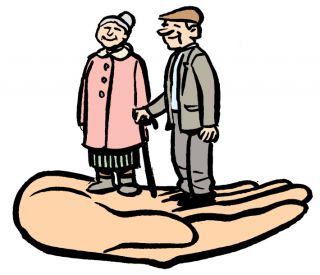Ageing in Ireland – A Measure of Success and why we can lead the way!

Ageing will be a dominant theme in the 21stCentury according to The United Nations World Economic and Social Survey. How we think about ageing can impact the policies we introduce and the supports we deem necessary.
Old age is not a disease, nor indeed is it an abstract concept. It is something we all do from the day we are born. Ageing is very much about strength and survivorship, triumph over all sorts of experiences, trials and illnesses.
While there is no specific age at which one is old or young, we know that populations are getting older. In demographic analysis, age 60 years is typically taken as the dividing line between older and younger cohorts of the population. In developed countries, many think of 65 years as the cut-off point because of eligibility rules for pension and social security benefits. Such cut-off ages vary around the world.
Globally, the number of people aged 60 years or older will rise from 900 million to 2 billion by 2050 (moving from 12% to 22% of the total global population). In Ireland it is predicted that those over the age of 65 will reach 1 million people by 2031. This significant change in the ageing demographics is a global phenomenon. It is, and should be seen as, a success story in relation to health. However, this success also challenges us all, as these additional lifespan years are not always lived in good health.
Ageing populations will influence social and health systems in multiple ways, including the need to increase health and social care spend. We can lead by example by focusing on our own country first and inspire progress to make Ireland a country we are all proud to grow old in.
Frailty, where multiple body systems gradually lose their in-built reserve, is one of the most challenging expressions of population ageing. It contributes in great part to the need by older people to make greater use of health and social care services and to the need to have longer hospital stays. This is one reason why services must be fit for purpose and age-attuned. Age demographics and frailty are also among the reasons a comprehensive public-health action on ageing is urgently needed. Although we are still building our knowledge base, we have sufficient evidence to act now. The World Health Organization identified four priority areas for action. These are aligning health systems with the needs of the older populations they serve, creating age friendly environments, developing systems for providing community and long-term care and improving measurement, monitoring and understanding.
We have a wonderful opportunity in Ireland to embrace our improving life expectancy, to promote independent living and add healthy years to life. And we must embrace it.
Modern Ireland has evolved into a forward-thinking society, leading the world in certain areas. Research into “Assistive Technology” is doubling every five years – from “monitoring” to “assisting care” and “smart homes”. This evolving concept of “Gerontechnology” and how it can assist and support us as we age has significant potential.
Digital literacy has also become a requirement for participation in most day to day activities. The practicalities of day to day living should be easier for all of us to navigate. To achieve this, we must ensure that our online, digital, and icloud dominated tech-world is accessible to all, not just the young. This is where Gerontechnology could really add to the quality of life for older people and support them to age well at home.
The Royal College of Physicians of Ireland (through clinical programmes, training and education), in conjunction with the HSE are playing a critical role in providing the vision and clinical leadership for ageing well in many areas, along with many voluntary organizations like ALONE, the Alzheimer’s society and the Irish Gerontological Society. But we can all do more. Health Promotion, Self-Care, Social Care and p olicy reform, informed by work from the family of longitudinal studies going on around the world, including our own Irish Longitudinal Study in Ageing (TILDA) will all play their part.
We need to recognize and acknowledge the important role older people have played and continue to play in our lives and society today. We must all become better advocates for the requirements of all as we age.
Seamus Heaney said “Believe that a further shore is reachable from here”. I believe that Ireland is in a great place to lead the charge and change in support for all of us as we age. We all want to age well. As a country we must strive to become an Ireland that leads the world in becoming age-attuned, age-accommodating and age-friendly. To do this we need a culture that upholds dignity, respect and compassion for each other over the course of our lives. We also need the support to live well into old age, and timely access to supports if and when we need them. While we each have a personal responsibility, there is also a shared societal and governmental policy responsibility. These are all interconnected. Progress cannot happen unless we all work together.
Dr. Diarmuid O’Shea is President of the Irish Gerontological Society and a Consultant Geriatrician at St. Vincent’s University Hospital, Dublin and gave a presentation on this topic at the Social Justice Ireland Annual Social Policy Conference – The Challenges of Success: Addressing Population Growth in Ireland on Tuesday, 26th November 2019.
To view the presentations from this confernece, Click Here.